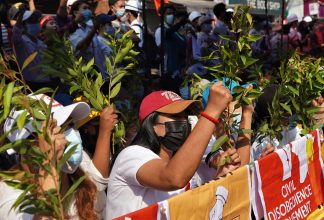One Year On, No Justice for Kawng Kha Rape
Myanmar authorities should allow an independent investigation into the rape and killing of two Kachin women from Kawng Kha Village, Northern Shan State, Civil Rights Defenders said today. A year on, there has been little progress towards identifying the perpetrators of the brutal rape, torture, and murder of the two victims. This case demonstrates the pressing need for the country’s incoming leaders to address impunity in genuine efforts to tackle sexual violence in conflict.
One year ago today two teachers, Maran Lu Ra and Nan Tsin, volunteering with the Kachin Baptist Convention, were attacked and killed at home in a local church compound in Kawng Kha Village. There were multiple knife wounds to their bodies and it was apparent that their heads had suffered severe trauma.
A new report by the Legal Aid Network and the Kachin Women’s Association in Thailand, Seeking Truth About Sexual Violence and War Crime Cases, documents the police investigation into this case. Their findings strongly points towards police negligence and military involvement in the investigation, and in some instances even deliberate tampering with evidence collection.
“Zero progress in seeking justice re-victimizes friends and family, and allows perpetrators to walk free,” said Brittis Edman, Southeast Asia Programme Director at Civil Rights Defenders. “Myanmar’s incoming leaders must show resolve to end impunity and promote accountability and justice for victims of sexual violence in conflict.”
The Tatmadaw has a documented history of using rape and sexual violence as a systemic weapon of war in areas strife with ethnic conflict, including in Shan and Kachin States. These cases are rarely followed by a thorough or impartial investigation, and seldom are members of the Tatmadaw held to account. If the new NLD government is sincere about a national peace and reconciliation process, authorities need to commit to ending impunity for crimes of sexual violence in conflict.
The day of the incident, soldiers from the 88 Light Infantry Division, Battalion 503, arrived at the village to stay the night. The villagers who discovered the bodies of the two women testify to seeing multiple boot prints at the site of the killings, resembling those worn by Tatmadaw soldiers. Well before any credible forensic evidence could be conclusively drawn forward, state authorities issued a public statement absconding the military of all involvement in the rapes. Authorities further warned that legal proceedings would be brought against anybody who suggested military involvement in the Kawng Kha case.
In June 2014 Myanmar signed the Declaration of Commitment to End Sexual Violence in Conflict, outlining a set of practical commitments to put an effective end to rape as a weapon of war. Under international humanitarian law, sexual violence stands as one of the gravest violations. The government of Myanmar has an unconditional responsibility to promptly investigate all incidents of sexual violence and torture, and hold perpetrators to account. The government should prioritise strengthening access to justice for the victims of sexual violence.
Under the Convention on the Elimination of All Forms of Violence Against Women the state has an obligation to prohibit and eliminate all forms of sexual violence against women. This coming July, the CEDAW Committee will conduct a review of Myanmar’s commitment to the incorporation of the CEDAW convention. The incoming government should formulate a concrete plan towards the elimination of all forms of violence against women, particularly the systemic use of sexual violence in conflict areas. Additionally, the government should protect the space for civil society groups to independently monitor and investigate incidents of sexual violence as part of their human rights work.
In the absence of any form of a credible investigation into the rape and killings of these two teachers, authorities should allow an independent investigation into this case. They should request the assistance of the UN and others to strengthen national capacity to effectively hold perpetrators to account and support the survivors of sexual violence.

